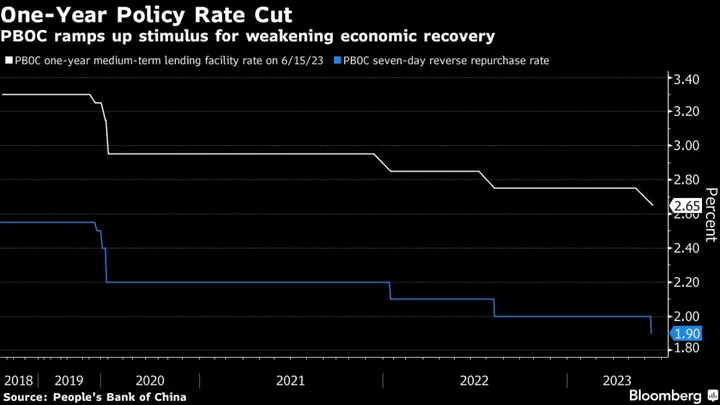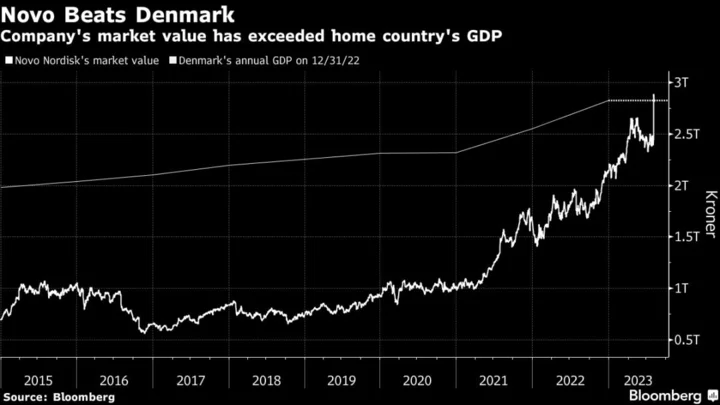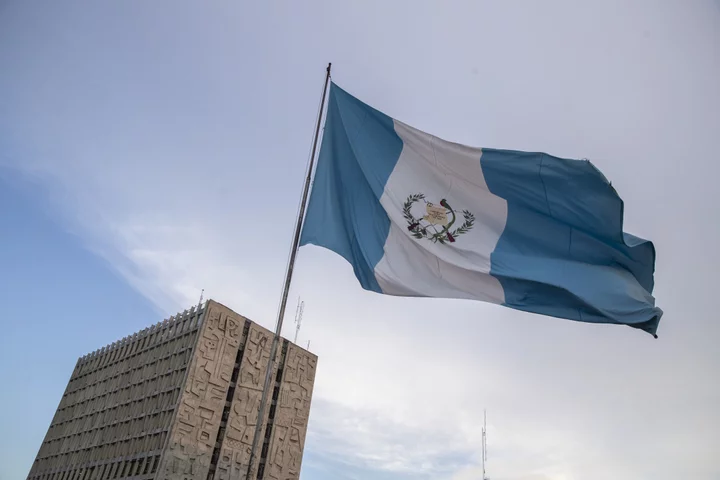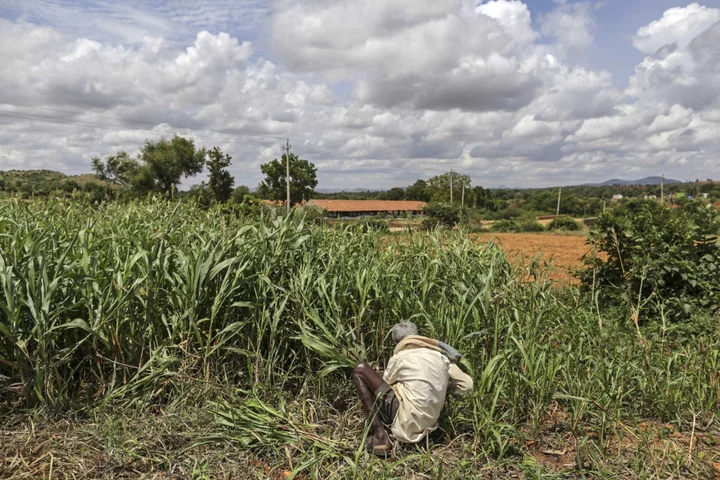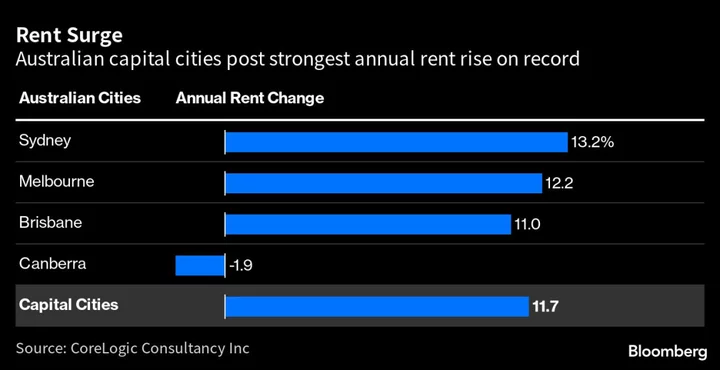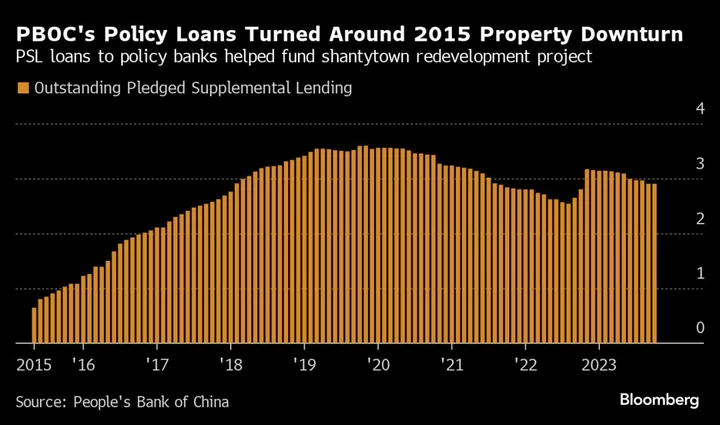Fresh inflation readouts this week will probably feed into expectations of further policy tightening by Federal Reserve and European Central Bank officials who are already tilting toward raising interest rates.
The Fed’s preferred price metrics on Friday are projected to show inflation, particularly when food and fuel are excluded, remained elevated in May. The personal consumption expenditures price index, as well as the core rate, is still running well above the US central bank’s 2% goal — a point Fed Chair Jerome Powell conveyed to lawmakers in the past week.
The core PCE price index probably rose 4.7% from a year ago, matching the prior month’s annual advance, economists project. On a monthly basis, the core measure is estimated to rise 0.4% for the fifth time in the last six months.
However, Fed officials may take some comfort in a further softening of the overall price measure. The PCE price index is seen cooling to 3.8% from May 2022, marking the first sub-4% print in more than two years.
The personal income and spending report is also forecast to show inflation-adjusted consumer outlays softened after a solid start to the second quarter.
Across the Atlantic, ECB officials on Friday will get fresh consumer-price data that’s expected to show the pace of underlying inflation in the euro area accelerated in June.
What Bloomberg Economics Says:
“May PCE inflation should be softer than April’s, boosting market expectations that the Fed will hike only once more this year. We estimate that the headline, core and ‘supercore’ PCE deflators all cooled from April’s strong print. At the same time, personal income likely rose on the back of a strong jobs report, but personal spending moderated and personal savings ticked up as consumers recalibrate their spending habits.”
—Anna Wong, Stuart Paul, Eliza Winger and Jonathan Church, economists. For full note, click here
While overall inflation is seen slowing to 5.6%, the core measure is seen quickening to just below that level, at 5.5%.
Powell and ECB President Christine Lagarde can share their frustration at the stubbornness of price growth as they and a roll-call of other top central bankers head to the Portuguese hilltop resort of Sintra.
Starting Monday with a dinner speech by International Monetary Fund official Gita Gopinath, the euro-zone’s answer to the annual Jackson Hole Economic Symposium features a panel discussion on Wednesday at which the chiefs of the ECB, the Fed, the Bank of Japan and the Bank of England will share a stage.
Elsewhere, likely weakness in Chinese purchasing-manager indexes, a probable rate increase in Sweden, and inflation figures from Canada and Australia will be among the highlights.
Click here for what happened last week and below is our wrap of what’s coming up in the global economy.
Asia
China’s factory and service sector PMIs will likely be the most closely watched figures out of Asia-Pacific over the coming days as investors and policymakers try to gauge the state of the world’s second-largest economy and whether more stimulus is needed.
The PMIs out Friday will follow the summer edition of the World Economic Forum in Tianjin, China, where Premier Li Qiang is scheduled to make a keynote speech on Tuesday. The prime ministers of New Zealand, Mongolia and Vietnam and World Trade Organization Director-General Ngozi Okonjo-Iweala will also be attending.
Australia is also set to report its latest inflation figures on Wednesday amid expectations they should show a return to a cooling trend after the previous month’s unexpected acceleration.
Vietnam is expected to release second-quarter GDP results on Thursday. The finance ministers of Japan and South Korea are set to meet that day amid talk of a possible currency swap deal.
Tokyo price data at the end of the week is expected to show a further slowdown in core inflation, although underlying price trends may point the other way.
Pakistan faces a crucial week to see whether it can extend an IMF loan program due to expire on Friday. Finally, South Korea releases export figures on Saturday that will be scrutinized for signs of a possible bottoming of world trade woes.
- For more, read Bloomberg Economics’ full Week Ahead for Asia
Europe, Middle East, Africa
ECB officials will spend much of their Forum on Central Banking in Sintra in suspense about the latest inflation numbers. Italy’s data will be published first, on Wednesday, followed by reports from Spain and Germany the next day. The week will end with French statistics and the overall assessment of price growth in the euro zone.
With Germany revealed to have suffered a recession earlier this year and its economy showing no sign of a meaningful recovery, the latest Ifo business confidence reading on Monday will be informative.
The UK will have a quieter week after the drama of recent days, which saw a measure of underlying inflation surge to a three-decade high and the Bank of England respond with a bigger-than-anticipated, 50 basis-point rate hike. Hints of the ongoing property fallout from tightening may be revealed in house-price data on Wednesday and mortgage approvals on Thursday.
Europe’s key central-bank decision for the week will come from Sweden’s Riksbank on Thursday. With the krona at an all-time low against the euro, inflation still high and the economy showing signs of improvement, economists anticipate a quarter-point hike and a ramping up of bond sales. Officials may also divulge hints on the probability of a further hike in September.
Middle Eastern markets are mostly closed this week for Eid.
Further south, the Reserve Bank of Zimbabwe will likely keep its key rate steady next week. The central bank raised the rate by 10 percentage points on June 6 to 150%, the highest in the world, in a bid to tame inflation and protect the country’s weakening currency.
“We’ve already hiked rates and there is a limit to hiking rates,” beyond which point they will cause non-performing bank loans to increase, Governor John Mangudya said on June 20. It’s unclear when the rates decision will be announced.
- For more, read Bloomberg Economics’ full Week Ahead for EMEA
Latin America
Brazil’s central bank in the coming week will post its quarterly inflation report and the minutes of its June 20-21 meeting.
President Luiz Inacio Lula da Silva’s government appears to be all but out of patience with bank chief Roberto Campos Neto and his colleagues after they kept the key rate at 13.75% for a seventh meeting without providing much guidance on the future path.
The mid-June reading of Brazil’s benchmark inflation index likely slowed for a 13th straight month to as low as 3.4%, just 15 basis points above the official target, which is sure to add fuel to the Lula administration’s rage over continued double-digit interest rates.
In Chile, the national statistics agency posts six separate indicators for May, including unemployment, retail sales, industrial production and copper output.
Colombia winds up the week and month with urban and national unemployment data and the central bank’s rate-setting meeting.
Banco de la Republica is all but certain draw a line under its longest-ever and sharpest hiking cycle at 13.25%, making it the last of the region’s big five central banks to reach its terminal rate.
Banco Central de Chile will likely kick off the big banks’ easing cycles next month.
- For more, read Bloomberg Economics’ full Week Ahead for Latin America
--With assistance from Robert Jameson, Laura Dhillon Kane, Monique Vanek, Mike Cohen and Paul Jackson.

